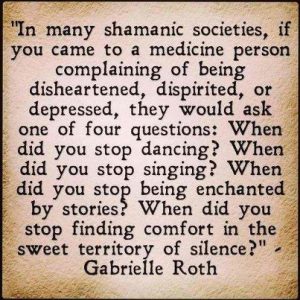It’s a wonderful life. It’s the most wonderful time of the year. Star of wonder. Winter wonderland.
So many songs of the holiday season remind us that the world promises moments of awe and amazement and wonder. As you read this, you might be picturing or feeling or reliving one of those moments. One slice of time sticks out for me from this past year. The lights were glowing soft and the room was cozy. My family was bundled together doing what we always do – sing. There is a moment in singing one of our favorite scores when the close, warm harmonies take a sudden enharmonic turn. Each time I sing these same few measures I get a tightness in my chest and a catch in my throat. The beauty of the sound is indescribable and seems to take me to a whole different world. The feeling is one of wonder and one of awe.
But then comes the day after, and the week after and the cold months after. Where did this feeling go? Is it possible to bring that magical feeling to my everyday life? And how do I think I can share the wonder and magic of music with my young children and their families if I can’t find it in myself? Maybe it is that I just lived the wonder ‘in the moment’ and never took time to figure out just how music gives me that entrance into a world of awe and beauty.
Fortunately for me, there are musician researchers and scientists out there who have pondered these same questions, and have also worked to find the answers. One of these researchers is Dr. Daniel Levitin of McGill University in Montreal, Canada. You might know his work from two books on music and the brain that made it to mainstream reading lists- This is Your Brain on Music and The World in Six Songs. (I think both books should be required reading for every music therapist.) Dr. Levitin spoke about magical musical moments in a recent podcast. You can listen to it at http://soundcheck.wnyc.org/2012/dec/20/magical-musical-moments/ . In the interview, Dr. Levitin discusses how music connects us to deep emotions with writer Anthony Tommasini who has been exploring the same topic for the New York Times.
Here is some of what I take away from the work of Dr. Levitin and his colleagues about creating wonder and awe through music for my young children and families.
We love certain types of music because it connects us to social meaning. The music of our early years gives us a place in our family and our community and our society. This is probably one reason I loved the carol we sang on that special night over the holidays. For the families I work with, I need to renew my attention to discovering and welcoming the music of their heritage. Here where I practice, we have a United Nations of cultures. Delving deeper into the qualities of their musical legacy can give me a musical dictionary of rhythms, melodies and harmonies to incorporate into the music of our sessions.
Particular musical sounds affect us deeply. We know that music can release chemicals in the brain that increase our experience of pleasure. These particular sounds are very individual…so that means that I need to make sure that I give my young children and their families an opportunity to experience a wide range of musical material. I often use the natural minor key in songs for my groups. It is coupled with a deep, quiet, complex timbre. I know from the faces of even my youngest members that this new musical experience brings them to a different emotional place. Their wide eyes and still bodies are all I need to know that for them, it is a time of wonder.
Moments of awe come from a combination of predictability and surprise. This one item seems to be the most important factor in music that awes us. Our brains are wired to look for patterns and reliability. But we also crave the unexpected and thrive on the challenge of integrating changes into our understanding. For my little ones, the surprise can be as gentle as an extra second or two of wait time before continuing a melody. For the toddler, the moment might come from a sudden change in dynamic from loud to very, very soft. The older child might shout out in joy when moving to a rhythm that changes from duple to triple or maybe un-even like five or seven.
You can access full articles by Dr. Levitin on his public web site: http://daniellevitin.com/publicpage/.
What music that you listen to gives you those chills of wonder? Do you plan for these moments in your life? How do you bring awe and amazement to the children in your life?
Hope to hear your stories to help fend away the winter chill!
Beth

